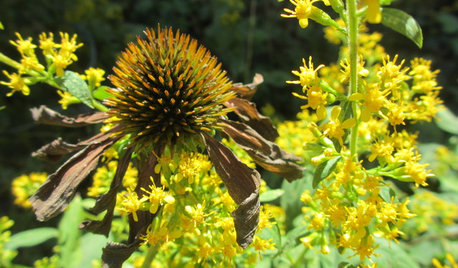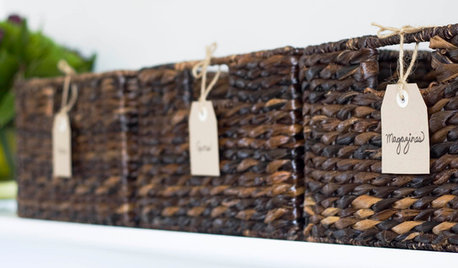Really , really gone organic this year and it's a freaking jungle
gnhelton
13 years ago
Related Stories

HOUSEKEEPING10 Things Neat Freaks Know to Be True
Do you err on the incredibly tidy side? Then you probably already live by these nuggets of neat wisdom
Full Story
FALL GARDENINGReflecting on a Gardening Year
Mistakes and successes, surprises and comforts. The garden helps us grow in new ways every year
Full Story
KITCHEN OF THE WEEKKitchen of the Week: 27 Years in the Making for New Everything
A smarter floor plan and updated finishes help create an efficient and stylish kitchen for a couple with grown children
Full Story
DECLUTTERINGSmall Steps for Keeping Your Housekeeping Resolutions
Take a different approach this year, making simple, positive changes that add up before you know it
Full Story
ORGANIZINGGet Organized: Are You a Piler or a Filer?
Tote out the bins and baskets and learn how to be an organized piler if file cabinets leave you cringing
Full Story
ORGANIZINGYour Total Home Organizing and Decluttering Guide
Take it slow or be a speed demon — this room-by-room approach to organizing and storage will get your home in shape no matter how you roll
Full Story
DECORATING GUIDESHow to Work With a Professional Organizer
An organizing pro can help you get your house together. Here's how to choose the right one and gain your own clutter-clearing skills
Full Story
ORGANIZING4 Questions to Help You Organize Your Favorite Photos
Organize your keeper photos with a system that's just right for you, whether it's in the cloud or you can hold it in your hand
Full Story
ORGANIZINGSmall Steps to Organizing Success
Take care of bite-size projects, and your home's big picture will be an organized dream before you know it
Full Story
MOST POPULAROrganizing? Don’t Forget the Essential First Step
Simplify the process of getting your home in order by taking it one step at a time. Here’s how to get on the right path
Full Story







jolj
gnheltonOriginal Author
Related Professionals
Brentwood Landscape Architects & Landscape Designers · Fillmore Landscape Architects & Landscape Designers · Peabody Landscape Contractors · Bloomington Landscape Contractors · Brandon Landscape Contractors · Placerville Landscape Contractors · South Lyon Landscape Contractors · West Haverstraw Landscape Contractors · Chicago Decks, Patios & Outdoor Enclosures · Clute Decks, Patios & Outdoor Enclosures · Manchester Decks, Patios & Outdoor Enclosures · Somerville Decks, Patios & Outdoor Enclosures · South Houston Decks, Patios & Outdoor Enclosures · Tooele Decks, Patios & Outdoor Enclosures · Scotts Valley Decks, Patios & Outdoor EnclosuresKimmsr
User
pnbrown
gnheltonOriginal Author
TheMasterGardener1
pnbrown
Kimmsr
TheMasterGardener1
taoseeker
pnbrown
TheMasterGardener1
pnbrown
TheMasterGardener1
gnheltonOriginal Author
feijoas
pnbrown
GreeneGarden
pnbrown
GreeneGarden
pnbrown
jolj
gnheltonOriginal Author
TheMasterGardener1
gnheltonOriginal Author
jolj
gnheltonOriginal Author
pnbrown
jolj
jolj
scarletdaisies
pnbrown
crankyoldman
pnbrown
julieann_grow
gnheltonOriginal Author
candogal
pnbrown
gnheltonOriginal Author
lavender_lass
regina_phalange